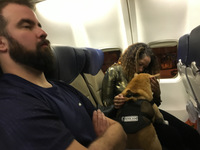 |
| Angelika/Mike Schilli |
|
|
|
Angelika We don't fly very often, but whenever we do, we notice that it has become quite common for passengers to bring their dogs onto the plane. And these are not always small dogs or dogs traveling in a pet carrier. No, the dogs walk into the plane on a leash and then sit on their owner's lap. Flying has already become a pure ordeal because the seats are too small and cramped, and everyone thinks they need to bring half their household onto the plane since all airlines are now charging fees for checked luggage.
I'm always quite annoyed when I board the plane. The idea that I might now also have a dog sitting next to me, slobbering everywhere, makes flying even more unpleasant for me. Well, I'm not exactly a dog fan, but dog lovers don't need to send me angry emails. I have nothing against people who own a dog, as long as they don't exploit the system and let their four-legged friend fly on their lap. By the way, I'm not the only one who gets upset about this bad habit, and for airlines, the issue is becoming more and more of a problem because some dogs go crazy in the unusual situation, poop in the aisle, bark nonstop, or even bite a seat neighbor.
How do dog owners manage to let their Fido fly for free? They simply declare it an "Emotional Support Dog," essentially a supposed therapy dog that provides emotional support to the owner. This should not be confused with a properly trained service dog, which, for example, helps blind people in their daily lives or warns its owner of epileptic seizures. Service dogs are trained to perform specific tasks for their owners that they cannot carry out due to a disability. These dogs cost a lot of money (on average $20,000) due to the rigorous training. Since these types of dogs are vital for their owners, they are allowed to go anywhere, even places where dogs are normally not permitted. In California, for instance, dogs are not allowed inside restaurants or stores where food is sold.
The American Disabilities Act (ADA) ensures that people with disabilities do not have to provide detailed proof that their dog is a service dog. Only two questions are allowed to determine if the dog truly serves this function: "Is the animal required because of a disability? What tasks has the animal been trained to perform?" Given that lawsuits are a common threat in America, I can understand why those responsible might prefer not to inquire too deeply in case of doubt.
The "Emotional Support Dog," on the other hand, is not specially trained but has a calming effect on its owner. If you search for "Emotional Support Dog" on Google, a multitude of providers will come up, where you can register any random dog with a mouse click and at the same time receive a letter from a therapist confirming that the dog is important for their mental health. Also, Amazon sells vests for service animals which identify the dog as an alleged service dog, which can be easily ordered by the dog enthusiast.
Unfortunately, it is now indeed the case that airlines, due to the "Air Carrier Access Act," must allow these "Emotional Support Dogs" on planes alongside legitimate service dogs. No one anticipated that selfish dog owners would ruthlessly exploit this loophole. For people who genuinely need a service dog, this leads to many problems, as no one can distinguish a real service dog from a falsely designated "Emotional Support Dog." Therefore, those affected have long been calling for this loophole to be closed.
On United Airlines and Delta Airlines flights, stricter regulations for dogs flying in the passenger cabin have been in effect since March 1st of this year. According to Delta Airlines, the number of dogs designated as service dogs or "emotional support dogs" on their flights has increased by 150% since 2015, and complaints about animals on board have also risen. Passenger complaints about dogs have surged by 84%. According to the new rules, dog owner must submit a health certificate 48 hours before departure, along with a letter proving why the dog is needed as emotional support. The health certificate should list the dog's vaccinations and include a certificate ensuring that the dog will behave on the plane. I am curious to see how this will be circumvented again.
By the way, passengers are not only trying to pass off their dogs as emotional support animals, but they also bring all sorts of other creatures like snakes, parrots, or pigs. Not to mention the woman who tried to board a United flight with her peacock, which was denied. We also constantly see dogs in supermarkets that are certainly not service dogs; the owners usually justify it by saying that dogs tied up outside the store are often stolen (4). Restaurants are usually more stringent and only allow dogs at outdoor tables (where it is legal), because the health inspector would quickly revoke their license if a dog were found inside.












